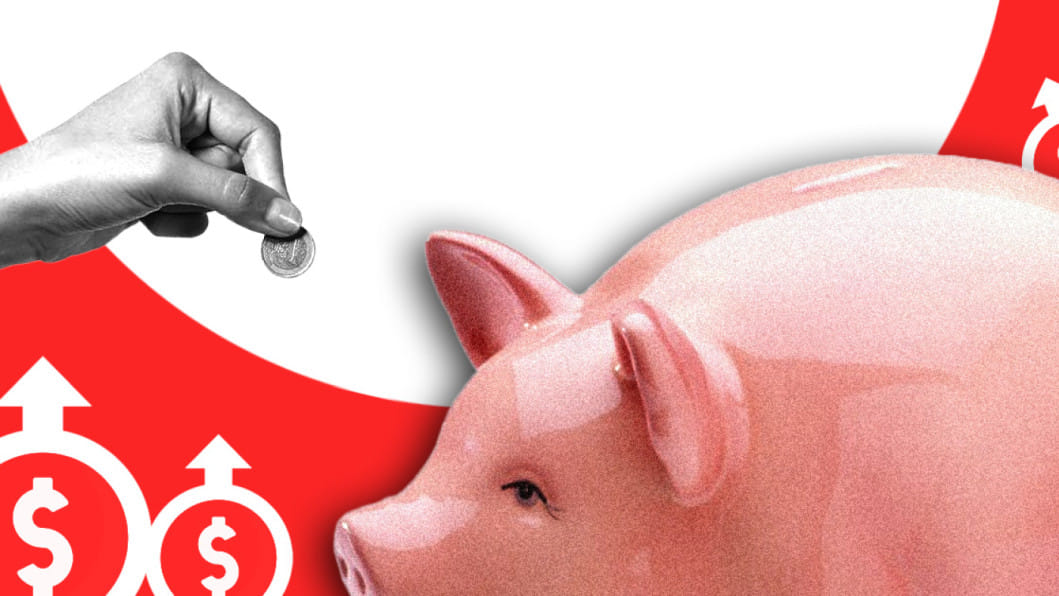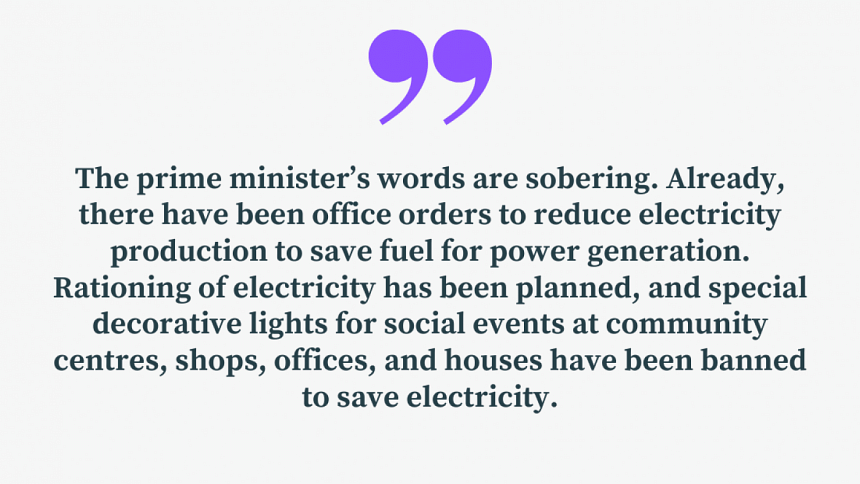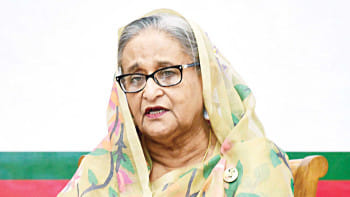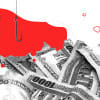A sobering call for austerity

In a rare public call, our prime minister has asked us all to maintain austerity to cope with the economic fallout caused by the Russia-Ukraine war. As a statesperson, she reminded us of the consequences of the war that we are facing in the developing world. The sanctions on Russia, following its invasion of Ukraine, have disrupted our energy supply chain, crippling our electricity production, forcing us to return to the nightmare of load-shedding that was a recurrent feature 20 years ago. The domino effects of the economic sanctions on Russia are causing a humanitarian crisis throughout the world via inflation and a spike in food prices.
Prime Minister Sheikh Hasina made an additional call to utilise every plot of available land to grow food, so that we can be self-reliant for food. The idea is simple: We need to reduce food imports to save foreign currency. She also, probably for the first time, admitted that "the burden" of 1.1 million Rohingya refugees is a bit too much at a time when we are all suffering, and the world should do something for their repatriation. The message is clear: We cannot afford to be generous when the world is not ready to reciprocate. The government knows that, now that the Western world is focused on the influx of "blue-eyed," "light-skinned" refugees from Ukraine, little attention will be paid to the forgotten people forcibly displaced from Rakhine. The mineral-rich, strategically located Myanmar's weapon-savvy junta can flout democracy and persecute its own people to make refugees out of them, and still remain a darling of the West. Such is realpolitik.
This makes me think of an African proverb: "When the elephants fight, it is the grass that suffers." The prime minister's words are sobering. Already, there have been office orders to reduce electricity production to save fuel for power generation. Rationing of electricity has been planned, and special decorative lights for social events at community centres, shops, offices, and houses have been banned to save electricity. Load-shedding is back with a vengeance. Earlier, we heard of a curb on unnecessary foreign travel by government officials and postponement of some less important development projects. The drive included the devaluation of our local currency. Now, there are indications that all types of subsidies, such as for fuel, water and electricity, will be slashed – a signature World Bank/IMF prescription.
So, what went wrong? Our economy was going strong even during the pandemic. We had some extravagant events even when the world was reeling from the ills of the coronavirus. Our hard-working remittance earners continued to send money to aid their relatives at home. Our industrious workers defied the threats of the pandemic to meet export deadlines to keep the economy alive. And we demonstrated extreme resilience to adapt to a digital reality over the last two years.
Then came the Russian invasion of Ukraine; nobody expected it to last this long. Everyone started to feel the pinch. Most of the countries were upfront in their responses. Some of them increased their military budget, some compromised their climate action plans to ensure the immediate supply of fossil fuel, some took economic measures to protect their vulnerable groups, and some pursued austerity. It's every man for himself.

The double standard of the West became apparent as European countries continued to import Russian gas notwithstanding the sanctions. Political analysts feel that these countries undermined the effectiveness of sanctions by refilling Russia's depleted foreign currency reserves. When, at a US-India ministry-level meeting, the Indian foreign minister was asked to stop importing Russian oil, he categorically said, "If you're looking at energy purchases from Russia, I'd suggest your attention be focused on Europe. We do buy some energy, which is necessary for our energy security. But I suspect, looking at figures, our total purchases for the month would be less than what Europe does in an afternoon."
Unfortunately, we don't have the strength to voice out our needs. While we critiqued the sanction, we couldn't say that we would buy the cheapest raw material for our energy production. Instead, we are ruminating over paying USD 41 per unit of LNG, which was USD 4 prior to Covid. The bulk of our energy production has relied on imported LNG. What happened to our gas, coal, hydro and solar projects? Did we focus too much on a quick fix while ignoring a wide range of energy production sources? Is there any follow-up on the solar panels that we are all forced to install?
How effective will our solution of local austerity be if we don't address the issue from a global perspective? The World Bank predicts long-term damage to global growth due to this ongoing crisis. It calculates global growth to slump from 5.7 percent in 2021 to 2.9 percent in 2022. "As a result of the damage from the pandemic and the war, the level of per capita income in developing economies this year will be nearly five percent below its pre-pandemic trend," it says.
Our prime minister's message is a wake-up call to the forthcoming recession. While austerity is one tool of arresting the economic downslide, we also need programmes for robust fiscal activism. Given the devaluation of currency, there is no political and public mood for savings. It will be difficult to inculcate a desire for austerity. The challenge, then, is to dare to think big, act big: earn the confidence of the big economic blocs, encourage trade and investment. Give social security to the vulnerable groups. It's time to have a new dream, fulfil it, and return to the world stage.
Dr Shamsad Mortuza is the pro-vice-chancellor of the University of Liberal Arts Bangladesh (ULAB).

 For all latest news, follow The Daily Star's Google News channel.
For all latest news, follow The Daily Star's Google News channel. 










Comments